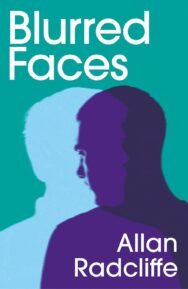‘Radcliffe writes with an enviably economical and engaging style.’
David Robinson finds that Allan Radcliffe’s second novel, Blurred Faces, impresses him just as much as Radcliffe’s debut.
Blurred Faces
By Allan Radcliffe
Published by Fairlight Books
Tinder began in 2012, Grindr in 2009 and ever since then, I can’t help thinking, the meet-cute in film and fiction has been on its way out. Allan Radcliffe’s Blurred Faces, for example, begins like this:
‘David lives 1.07 miles away. I walk the blue line on the screen of my phone, the usual thrill and shame in my body.’
David (or Davie as he then becomes once introductions are over) answers the door, and within a couple of pages, he and Jordan are having sex. Barbara Cartland it ain’t.
You would have to loosen the stays of any traditional definition of romantic fiction to an extent before it would fit Blurred Faces. And yet – what’s this? – only a couple of days later, the two men are having a meal in a cafe-bistro on Edinburgh’s Elm Row, when Jordan spills a drink over his shirt, Davie tries to mop it up over a napkin, and their hands meet ‘in full view of the street’ and well, I’ll let Davie take up the story: ‘Course, my brain’s doing its dinger… I’ve forgotten how this is meant to work. Romance. Not that I’m looking.’
So yes, Romance. But straight afterwards, all its cliches undercut.
Or rather, reversed. Because that accidental meeting of hands is how romance used to begin in the pre-dating app age, those distant days when sex was something a relationship put some way off in the future rather than right at the starting post. The post-app age has different ways of expressing that state of wishful anxiety about hand-holding where one half of the couple doesn’t know whether or not their feelings are reciprocated by the other. These days, I presume, the equivalent is worrying over whether a text message like ‘Maybe we could meet again?’ counts as being too forward or whether putting an X at the end is too uncool. Jane Austen could crank out a whole chapter on how her heroines faced this precise emotional turmoil in Regency England. In the 21st century, all we can hope to match that with is a finger hovering over the Send button.
Yet so far, I must confess, I have been doing Allan Radcliffe – whose fiction I have admired since reading his McKittrick and Saltire shortlisted debut novel The Old Haunts – a disservice. Because the key question about Blurred Faces isn’t whether or not it is a romantic novel, but something that happens as soon as Davie opens the door to Jordan. And no, I don’t mean the sex.
What drives the entire novel is the fact that the two men – in their early forties, though both told the dating app they were in their late thirties – knew each other from school. Back then, when neither was out, Jordan was bullied relentlessly. Davie was one of the bullies – not the worst, but enough of one to feel guilty about it all these years later. Somehow, the fact that Jordan doesn’t remember this makes it all the worse. Is he just pretending not to recognise Davie from all those years ago or has he genuinely forgotten?
So that’s the story: a casual hook-up between Jordan, a language teacher from London on his first visit home for five years, and Davie, an unemployed barista who has just broken up with his boyfriend of 17 years. At the end of their first brief encounter, they go through the ‘panto of swapping numbers’ and that, you might think, will be that. A short story with an intriguing secret at its heart, but not a novel.
I can understand that critique. It was also made about The Old Haunts (another teacher coming back from London for a short-stay visit to his native Edinburgh) and I thought it was wrong there too. For one thing, the whole subject of just what it is that sparks a loving relationship from a casual encounter isn’t slight at all, but one of life’s great, delicious mysteries. Not only that, but it’s one that, of all art forms, the novel excels.
Why? Because it can handle complexity. In Blurred Faces that business of bullying at school isn’t the only buried secret between the two men. Both have lost a parent, and in the case of Jordan’s alcoholic dad, that death badly scarred the rest of the family. Both are emotionally fragile after having lost lovers: in Davie’s case, the collapse of his long-term relationship (one in which, significantly perhaps for our story, he and his partner never held hands) has left him feeling aimless, while Jordan is still shaken by his failure to realise that a younger man he had fantasised about wasn’t interested in him sexually.
The format – alternate chapters from either Davie or Jordan’s point of view – is an obvious way of showing what each of the characters is missing about the other. It could be clunky but here it’s not, mainly because of the ease with which Radcliffe slips between his characters’ past and present. Just to take one example, the moment Davie realises who he’s just had sex with, that he’d known Jordan at school, is only later that night in the gay pub when he is drinking to assuage his raging loneliness. There’s a snooker game going on in the background as he remembers, some of his ex-lover’s mates are pointing him out, and all of this registers at least as much as the first stirrings of guilt over Jordan. In a couple of paragraphs inside Davie’s head, you have slid back – first by four hours and then by three decades – and you have hardly noticed at all.
Initially, the two men don’t seem to have much in common. At that first meeting, for example, while Davie answers the door in a T-shirt advertising Ingliston Truck and Trailer Fest 2004, Jordan is ‘smart and sober, like he’d taken a wrong turn on his way to the Lyceum’. And although that dark schooldays secret hangs between them, they have other shared memories too. Both have lived through times when anti-gay prejudice was rife, when they would be terrified of being seen in a gay disco by any of their parents’ friends or anyone from school. And though some yobs catcall them as they walk down the street together, times have clearly changed; We’re mainstream now,’ Davie says. ‘We’ve assimilated.’
Radcliffe writes with an enviably economical and engaging style. The secondary characters do more than just triangulate the relationship of Jordan and Davie – Jordan’s brother Niall and his retired nurse mother are particularly well drawn. The Edinburgh background – the city has, according to VisitBritain, ‘the largest gay scene in the country’ – is equally true to life: indeed, with so many of the places mentioned retaining their authentic names, Blurred Faces is probably the most clearly Edinburgh-focussed novel I have read for a long time.
Blurred Faces, by Allan Radcliffe, is published by Fairlight Books, priced £10.99.














